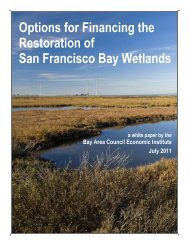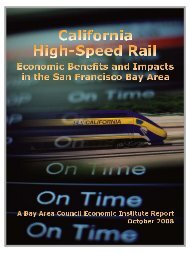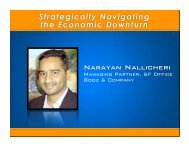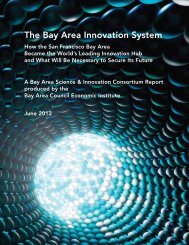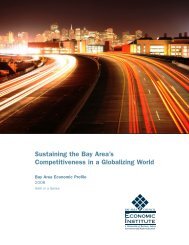Ties That Bind - Bay Area Council Economic Institute
Ties That Bind - Bay Area Council Economic Institute
Ties That Bind - Bay Area Council Economic Institute
Create successful ePaper yourself
Turn your PDF publications into a flip-book with our unique Google optimized e-Paper software.
64<br />
<strong>Ties</strong> <strong>That</strong> <strong>Bind</strong><br />
seven-day banking at many branches; trilingual ethnic Chinese staff (Mandarin, Cantonese, English)<br />
and bilingual Chinese/English brochures and ATM access; and assistance with social security<br />
numbers, driver’s licenses and tax preparation.<br />
In 1998 First Pacific’s Indonesian owners came under financial pressure to sell United Savings as<br />
a result of the 1997 Asian economic crisis. Wu, by then president and CEO, led a management<br />
buyout. United Savings’ charter was changed from that of a savings and loan to a commercial<br />
bank, and it was taken public as United Commercial Bank.<br />
Wu next broadened UCB’s strategy to include trade finance. Specifically, Southern California was<br />
the leading U.S. gateway for trade with Asia, yet no Chinese-focused bank had a presence in both<br />
California and Asia to serve trade finance customers. UCB opened a representative office in<br />
Hong Kong in 2002, and a short time later received Hong Kong Monetary Authority approval<br />
for a full banking license. At the end of March 2006 UCB’s Hong Kong branch had over<br />
US$600 million in deposits and US$400 million in loan commitments. The bank has subsequently<br />
added to its Asia trade finance and private banking coverage with representative offices<br />
in Taipei and Shenzhen.<br />
UCB has expanded its U.S. branch network through a combination of organic growth and acquisitions<br />
in New York, Boston and Seattle, along with the 2002 purchase of the historic Bank of<br />
Canton in San Francisco. Of its 56 U.S. branches, 47 are in California and 27 are in the <strong>Bay</strong> <strong>Area</strong>.<br />
Today, UCB’s mix of commercial, real estate, construction and international trade finance is targeted<br />
at small and mid-sized businesses, with loans in the $500,000 to $20 million range. UCB<br />
reported $7.99 billion in assets as of March 31, 2006, and has set a growth target of $15 billion in<br />
assets in 2010.<br />
Other <strong>Bay</strong> <strong>Area</strong> banks are expanding their trade finance activity, with Greater China as their<br />
principal focus. Bank of the Orient was opened in San Francisco in 1971 by Ernest Go, member<br />
of an overseas Chinese family in the Philippines with international banking interests. Its first<br />
downtown office bridged the adjoining neighborhoods of Chinatown and the city’s financial district,<br />
and catered to what Go saw as an underserved market of Asian-American small and medium-sized<br />
businesses. A Chinatown branch opened a year later. The bank’s business expanded<br />
over the years with a strong mortgage portfolio in one of the nation’s most consistently expensive<br />
residential real estate markets.<br />
Bank of the Orient’s growth strategy has primarily involved community banking in Chinatowns<br />
or Asian-American population centers in San Francisco, Oakland, Millbrae and City of Industry<br />
in Southern California. In 2000 it opened two Honolulu branches with the acquisition of the<br />
Bank of Honolulu.<br />
In 1986 Bank of the Orient upgraded a representative office in Xiamen, a port city and designated<br />
Special <strong>Economic</strong> Zone directly across from Taiwan, to full branch status. Xiamen, one of<br />
China’s wealthiest cities in terms of per capita GDP, has attracted significant international trade,<br />
investment and tourism in the past decade, and the Fujian provincial government has further<br />
economic and infrastructure development plans along the entire western coast of the Taiwan



